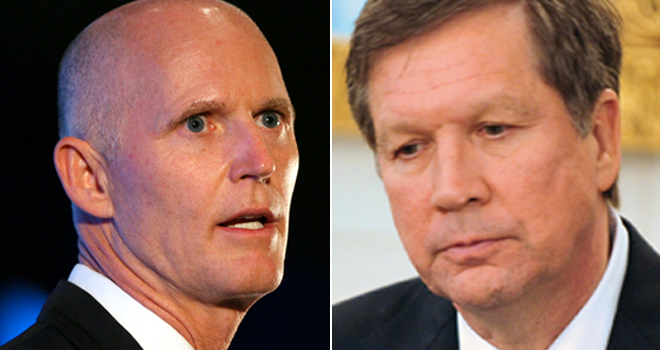When several newly minted Republican governors began pushing through broad, unpopular legislation this year, they may have unintentionally aided President Obama’s reelection odds.
Emboldened by their party’s midterm election day romp, freshman GOP governors in a few crucial swing states immediately began to advance radical legislation upon taking office. But as the cost of those unpopular legislative agendas has now become clear in the form of free-falling approval ratings and incredible buyer’s remorse, polls have shown that that same voter discontent could translate into a big 2012 boost for President Obama.
As Politico pointed out, Florida is perhaps the best case of this. With 29 electoral votes, Florida is an enormous prize in presidential elections, and one that is sure to be hotly contested in 2012. Obama won the state by a mere 3-point margin in 2008, and now, as Gov. Rick Scott’s approval rating has nosedived, Obama’s standing in hypothetical matchups of the 2012 race has improved.
Scott riled his constituents right off the bat by pushing to scale back teacher’s benefits, trying to tie performance to pay and seeking to eliminate tenure for future hires. Then last week, he signed a budget that slashed $4 billion dollars in spending, including major cuts to education and Medicaid — but not before vetoing an additional $615 million for items such a public broadcasting and public universities.
A Quinnipiac poll released last week found that just 29% of voters approved of Scott’s job performance, while a 57% majority disapproved. At the same time, Obama’s approval rating rebounded from a negative 44% to 52% split in April to a positive 51% to 43% in May, and he increased his leads over each of several high-profile 2012 GOP contenders. Certainly some of that Obama bump is wholly unrelated to Scott — the killing of Osama bin Laden, for one — but Scott’s unpopularity is sure to be a weight on his party’s candidates next year if his standing doesn’t improve.
In Ohio, a similar scenario has unfolded, where union-busting Gov. John Kasich is now so unpopular that a recent PPP poll showed him losing a do-over election by an astounding 25-point margin. In that same poll, just 33% of voters gave Kasich positive marks on his job performance, compared to 56% who said the opposite, tying Kasich with Rick Scott as the most unpopular of 38 governors PPP has surveyed.
Meanwhile, Obama posted comfortable leads against each Republican challenger pitted against him in 2012 contests in that state, despite posting a middling approval rating, with 46% of voters giving him a thumbs up versus 49% who gave him a thumbs down. In releasing those findings, PPP’s Tom Jensen credited voter discontent with Kasich for helping put Obama over the top.
“Kasich and his first term Republican brethren across the Midwest may be the best thing that’s ever happened to Barack Obama’s reelection chances,” Jensen wrote.
“You have a situation where people voted Republican last year and are quite unhappy with the results and that might keep them from voting Republican again next year whether they’re enthralled with Obama or not,” he added. “That series of Midwestern losses last year may end up actually enhancing Obama’s chances for another term.”
Like Florida, Ohio is a delegate-rich state, sporting 18 electoral votes. The perennial swing state has also gone to the victor in each presidential election since 1960, tipping to Obama by a five-point margin last year.
Wisconsin and Michigan could also tilt Democratic in 2012 thanks to their unpopular governors.
Wisconsin is the signature case of a freshman GOP governor blowing his political capital in a drive to ram through wildly unpopular legislation. Gov. Scott Walker made national headlines earlier this year when his drive to curtail collective bargaining rights for public unions sparked weeks of massive protests in the capitol city and deadlocked the legislature as Democratic lawmakers fled the state to stall the bill. Walker’s approval rating tanked, capped off last week when a PPP poll found that a 50% majority of voters wanted to remove Walker from office. Also telling, that poll showed that in addition to wanting to put a Democratic governor in Walker’s place, voters wanted to elect more Democrats to the state legislature as well.
Then there’s Michigan’s Rick Snyder, whose “financial martial law” bill — which would allow appointed bureaucrats to dissolve municipal governments in struggling cities and void union contracts — sent his approval rating down to 33%, with a 50% majority of voters disapproving of his job performance. Snyder won his first term last year with an 18-point thrashing of Democrat Virg Bernero; by March, PPP showed him losing a do-over election by two points. In the wake of that finding, a poll showed both Obama and Sen. Debbie Stabenow, who just months prior had looked vulnerable to defeat in 2012, boosting their leads over prospective challengers.
Obviously there is a long way to go before voters cast ballots in the 2012 election, and a whole host of factors will go into determining whom they choose. There’s also the chance that these unpopular governors rebound dramatically and don’t drag down the party’s other candidates in 2012. But as it stands, their terrible standings look like a potential boon to Obama, giving him a lift in the states where he’ll need it most next year.






